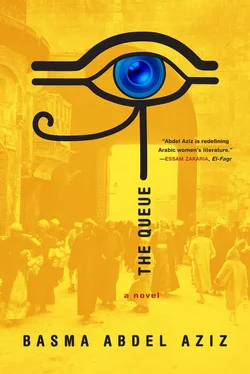The man in the galabeya was the first to embrace the High Sheikh’s fatwa: he took a microphone, stood alongside the queue, and read the statement aloud from a copy in his hand. He’d turned off his phone and placed it in his inner breast pocket so it wouldn’t attract attention; the woman with the short hair had recently accused him, in front of everyone, of discrediting the boycott campaign to defend Violet Telecom, while secretly using another phone network himself. She had discovered that he hadn’t been affected by Violet Telecom’s surveillance measures at all, and — more significantly — that he owned a large amount of stock in the company.
After concluding his slow and deliberate reading, he announced enthusiastically that he would dedicate his next weekly lesson to “God’s will,” to introduce people to fatwas and explain their importance. He urged people who had joined the boycott campaign to attend his lecture, to listen and make use of what he said, and he secretly hoped that God would let him be the one to inspire them to turn away from temptation and embrace the truth.
Ehab didn’t hear the fatwa, but before long he found a copy on a faded slip of paper with tattered edges.
From the Fatwa and Rationalizations Committee, on the Fifth Day of this Venerable Month:
In light of its meeting today, the Committee hereby announces this fatwa to the entire nation, to ward off civil strife and its evils, and preserve the country’s integrity. To keep those of faith from succumbing to sin in the eyes of God Almighty, all believers must verify any news before giving it credence, and all those who make claims must substantiate their assertions with proof, lest they spread false allegations and therefore corruption. Believers shall not boycott their brothers, nor cause them to suffer financial or emotional distress, and shall not call upon others to take such actions, as this is one of the gravest sins, unless done in support of religion. A believer who is weak of faith, and does not join his brothers, is guilty of a sin, which shall be weighed on Judgment Day. This sin can be absolved by fasting, or by making seven consecutive phone calls, each one not separated by more than a month. Our Book pronounces this truth upon you. May God lead you to the path of righteousness, and may His peace, blessings, and mercy be upon you .
[ The High Sheikh’s signature, and an illegible date ]
Ehab folded the paper up and put it in his notebook, and then wrote the time of the lesson on the last page, the one filled with lists of numbers and dates and names. He walked off, determined to attend the lesson and record what wisdom the man in the galabeya would bestow upon his disciples. He wondered how the man would answer their questions, and Ehab’s own, which he also wrote in his notebook, underlining several times the ones he considered most important.
After opening prayers, appeals for protection from Satan and his vile machinations, and entreaties that his supporters be spared eternal damnation, the man in the galabeya began a rousing discourse. He spoke of the need to verify every word one utters, and insisted that a believer’s behavior and decisions could not be built upon doubt. He didn’t say a word without supporting it with passages from the scripture, and he won most people over, especially those who had come from beyond the queue for the first time. Many wept during the lesson, including Um Mabrouk. She realized that much of her bad luck wasn’t due to God’s anger with her personally, but with humanity as a whole, due to those who had forsaken religion’s teachings, and given in to Satan’s whispers. She cried harder as the man sonorously recited a passage from the Greater Book that cautioned against telling untruths about others or passing on false rumors, and when he explained the passage, she felt that his speech was meant for her. Her tears streamed down her face, and she swore to herself repentantly that she’d abandon the cell-phone boycott and instead only blacklist the candy factory, since she’d seen with her own eyes the candies that Shalaby had destroyed. The man in the galabeya imparted some of his own theological opinions on the fatwa, too. He said it was the right of a father — and those of a father’s rank and position — to watch over his children, using all available means. This could not be considered an infringement of their privacy, he added, and ended his speech by saying that honest citizens had nothing to hide from their guardians.
Ines appeared at the end of the lesson wearing a loose white veil that fell halfway down her stomach, concealing her breasts. After people had dispersed from the front of the queue and crowded around the man, she tried to pass on the lesson’s advice to the woman with the short hair, who stood watching from a distance. She hoped to dissuade her from continuing the campaign, but wasn’t met with any success. The woman with the short hair redoubled her efforts, and the next day she printed oppositional leaflets responding to the allegations made by the man in the galabeya , and declared that she would continue the campaign. Ehab had helped her draft the text, and alongside her statement they’d included another passage from the Greater Book, which urged people to respect and defend personal privacy. He wrote a hard-hitting and well-researched article about the campaign — its grounds and implications, and how many people joined each week — but the newspaper didn’t print it. Instead, they gave him a stern warning about “fabricating the news.” The editor in chief lectured him on how necessary it was to strive for accuracy and honesty in everything he wrote. Then he warned Ehab against giving in to ambition and trying to achieve professional or financial gains at the expense of journalistic ethics and principles.
The man in the galabeya intensified his lessons in response to the leaflets, making each lesson longer than the last. Shortly afterward, he was overheard speaking on his cell phone, while picking at the toes of his right foot, repeating that he’d done all he could. He told the person on the other end that he wanted to buy a horse and ride up and down the queue, from north to south, so he could give several lessons a day. He could disseminate the fatwa, temper the influence of the woman with the short hair, and achieve a greater heavenly reward. He was also heard confirming that the ban on cars entering the street would stay in place for months, perhaps even years, and lamenting that his feet didn’t allow him to walk very far.
The Gate’s Response
Tarek spent many fitful nights experimenting with all sorts of sedatives and sleeping pills until his colleagues commented on the dangerous quantities he was requesting from the pharmacy. He ignored them, his mind still preoccupied with Yehya’s fate, so consumed by his predicament that at one point he swallowed half a strip of pills in one go. But still, he couldn’t sleep. Sabah, who was temporarily managing the nurses, noticed his distress and took it upon herself to keep him away from patients, especially on the days when he arrived at the hospital with dark circles under his eyes. She watched him surreptitiously, and then went to him and reminded him of that strange official visit he’d received the morning after the Disgraceful Events. She revealed that she knew a lot about his patient, the one named Yehya Gad el-Rab Saeed — quite a lot, in fact. But despite all that she knew, she’d chosen to keep her mouth shut and his secret safe. Now she held something over him. She knew that if he noticed any misbehavior from her after that, he wouldn’t dare mention it. It was in their mutual interest to work together, for one to erase the other’s tracks.
Читать дальше











